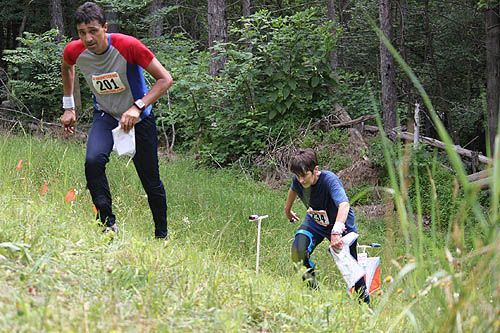
By Greg Nass
Nadim Ahmed of the Quantico Orienteering Club and
Sandy Fillebrown of the Delaware Valley Orienteering
Association.

DERRY, Pa. -- Alexis Rzewski stood breathless, debris clinging to his sweaty neck and face, the remnant of a cobweb dangling from his eyebrow. His pants were torn and blood oozed from a laceration in his knee.
"I'm high," said Rzewski, of Squirrel Hill. "I'm very high."
His exhilaration wasn't drug induced -- he'd just crossed the finish line of the Keystone Capers National Orienteering Meet.
The contest spanned two days, beginning June 25 in Deer Lakes Park in Tarentum and concluding the following day at Keystone State Park in Derry.
Competitors in 48 event classes determined by age and gender were divided among nine competitive courses on each day of the meet. Participants were required to find checkpoints or controls in a predefined sequence with winners selected by their combined two-day times.
Keystone Capers was one of the first Orienteering USA-sanctioned meets to be held in Western Pennsylvania. The event was hosted by the Western Pennsylvania Orienteering Club, of which Rzewski is a member and serves on the board of directors.
Rzewski and 11 other club members competed against approximately 170 orienteers from across the U.S. and Canada.
Rzewski said he started orienteering after he became bored with running.
"This is much more fun," he said. "It's like a surprise at every 10 seconds. It's very engaging."
Known as the "thinking sport," orienteering requires mental focus on map reading and land-feature identification.
"You have to pay excruciating attention to every terrain feature around you," Rzewski said. "It's about learning how to read terrain every 10 yards, so you're constantly looking around."
Such quick thinking was in play when Kseniya Popova of West Orange, N.J., captured the top spot in the Female Elite class.
Popova injured her ankle at the Deer Lakes course, but it didn't stop her from securing the win.
"After you get in the woods, determination comes out so I ran the course," she said. "I couldn't just walk."
Her husband, Sergei Zhyk, took first in the Male Elite class.
It was a fitting win for Popova and Zhyk. The couple met while orienteering in 2005 and will celebrate their one-year wedding anniversary in October.
"Many people choose other hobbies," Zhyk said. "This is our hobby."
The course at Keystone proved to be challenging as it traversed the forests and trails in full bloom.
Zhyk said it was difficult to maintain concentration while navigating through the thick vegetation.
"The challenge was to keep your focus and stay on your bearings and be disciplined with your compass," he said. "If you were not disciplined with the compass today, then you were all over the place."
For Popova, the difficult terrain provided an advantage.
"I liked it because I'm not a fast runner," she said. "Everybody's pretty much slowing down, and if I can keep up in this terrain then I can do better."
Anna Shafer-Skelton of St. Louis, Mo., tailed Popova throughout the weekend and took a close second. She said she wasn't sure what was going to happen after Popova twisted her ankle at Deer Lakes.
"I think she's really smooth and doesn't make any mistakes," said Shafer-Skelton. "She is really good at multi-tasking. I'll need to work on that."
Popova was a force to be reckoned with, but she wasn't Shafer-Skelton's biggest challenge.
"It was deciding where to slow down," she said. "There were some areas with really tricky vegetation [where] I should have slowed down, and I ended up going completely past the control and had to relocate off a trail and come back in."
Popova, Zhyk and Shafer-Skelton were among the serious athletes present at the national event last weekend.
However, Jim Wolfe, event director and president of the Western Pennsylvania Orienteering Club, said they were not indicative of the usual participants.
"Most of the people who come to our events are recreational orienteers," he said. "They are families that want to get out in the woods and have the challenge of doing a treasure hunt-like activity."
The club was founded in 2003. Wolfe said the club attracts new members every year, and participation at events is growing.
This upward trend may be due to the benefits of the sport.
"It's a task that you have to think about, so you can actually develop problem-solving skills. You also gain a great deal of self-confidence by completing one of these courses," Wolfe said. "It also does something we like to promote, which is getting out into the woods."